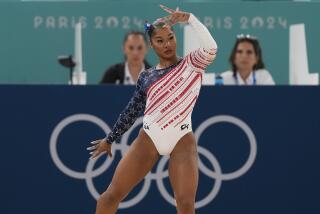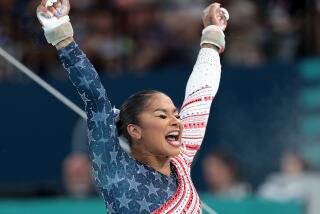PAN AMERICAN GAMES : USOC Backs Off Test Criticism : Doping: Later, Mexican rower and Canadian shotputter have positive tests.
- Share via
HAVANA — U.S. Olympic Committee officials attempted Tuesday to defuse another Pan American Games drug-testing controversy, saying that they are satisfied that alleged inconsistencies in the drug-testing procedure during the first 10 days of competition have been resolved.
USOC President Robert Helmick said that he sent a letter Monday detailing his concerns about irregularities in the drug-testing protocol to Pan American Sports Organization (PAS0) President Mario Vasquez Rana of Mexico.
The letter also was signed by a member of the International Olympic Committee’s anti-doping commission, Dr. Don Catlin of Los Angeles, an official observer here who was present at a meeting of the five-member PASO medical commission Monday night.
“They listened to our concerns and read the letter, then discussed it very openly and very professionally,” Catlin said Tuesday.
“In the grand scheme of testing, I’m not concerned. There’s nothing outrageous or egregious. I have no reason to doubt there’s going to be an improvement.”
Meanwhile, Vasquez Rana announced at a hastily called news conference Tuesday night that a Mexican rower, Jose Antonio Gomez, and a Canadian shotputter, Georgette Reed, tested positive for ephedrine, a banned stimulant commonly found in over-the-counter cold medications.
Although Vasquez Rana said that the medical commission believed that the drug use was inadvertent in both cases, he said that Gomez will be stripped of the gold medal he won in double-scull competition. He said that PASO officials will decide today whether the Cuban pair that finished second in that race will be awarded the gold medal, but it has been PASO’s policy in the past to allow the order of finish to stand.
Reed, who finished fifth in the shotput at this year’s NCAA championships while competing for Washington State, did not win a medal here.
Sanctions against the athletes will be determined by the international federations for their respective sports.
Vasquez Rana also said that it is possible the name of a third athlete whose urine sample tested positive for an unidentified banned substance in the preliminary stage of a test will be revealed Thursday.
“I am very satisfied with the work of the medical commission, and I am very satisfied with the performances of the athletes here,” Vasquez Rana said.
“Of 600 tests, there have been only two (confirmed) positives, and no (anabolic steroids) were involved.”
Asked about the USOC concerns regarding drug-testing procedures here, he said, “It was a private and confidential letter, and I will answer in that fashion.”
But he added that he believed the concerns were generated by Catlin, whom Vasquez Rana called “a not very professional doctor in these matters.”
Catlin was unavailable for comment Tuesday night, but Dr. Harvey Schiller, USOC executive director, said that the director of the UCLA analytical laboratory is “certainly a well-respected man in his field.”
Helmick, who left Havana on Monday, said by telephone from his Des Moines, Iowa, home earlier Tuesday that he wrote the letter after hearing complaints from Catlin and Dr. Wade Exum, the USOC’s drug control officer and a member of the PASO medical commission.
He said that the main concerns were the unavailability of laboratory results for medical commission members to review and inconsistencies in the collection process for urine samples. He said that six violations in the approved collection process were documented.
In one instance, an unidentified U.S. athlete was randomly selected for testing more than four hours after finishing a competition. According to international rules, athletes are supposed to be tested no more than one hour after competing.
“We want to be able to assure our athletes that the testing here is fair and accurate,” Helmick said.
But he added that there is no reason to believe that the integrity of the drug testing since the competition began on Aug. 3 has been compromised.
“There were certain irregularities that they personally observed, none of which have resulted in errors of testing,” he said.
“But there were errors that we thought we should bring to the attention of the commission so that we can have them corrected.”
Perhaps in an effort to avoid the communication problems they experienced at Indianapolis, PASO officials have declined to discuss drug-testing procedures.
Catlin said PASO plans to test 1,000 athletes before the end of the competition, although he said that not all medalists have been tested.
“I made it clear in the letter that we were very satisfied with the drug testing in Havana,” Helmick said Tuesday. “It wasn’t a letter of complaint. It was a letter to bring irregularities to their attention.
“At our urging, we have a very good drug-testing situation going on. The procedure has been better than in other situations we’ve had in the past. But we want to make it better.”
More to Read
Go beyond the scoreboard
Get the latest on L.A.'s teams in the daily Sports Report newsletter.
You may occasionally receive promotional content from the Los Angeles Times.






